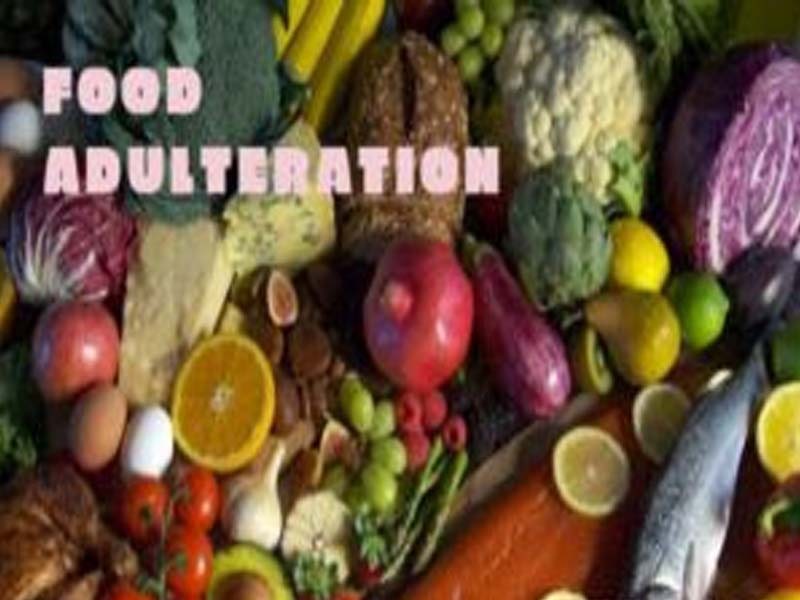FOOD ADULTERATION AND LAWS TO PREVENT IT
(By Manasi Agarwal)
What is Adulteration?
Adulteration of food is “the addition or subtraction of any substance to or from food, so that the natural composition and quality of food substance is affected“. Legally, it means that the food product fails to meet the standards set by the government. Most of the time, it is done intentionally by companies for various reasons. However, unintentional adulteration is usually attributed to ignorance, carelessness or lack of facilities for maintaining food quality.
The incidental contamination during the period of growth, harvesting, storage, processing, transport and distribution of foods are also considered as adulteration. With the changes in food habits, incidence of food adulteration is also growing.
The fast-paced life and ready-made food consumption culture is largely responsible for the manufacturers to adulterate. Severe and chronic diseases including cancer have been attributed to consumption of adulterated food. Maggi noodles, Kurkure and many other such products including soft drinks controversies are still etched in the memory. Many of the Patanjali products, claimed to be Ayurveda based, natural and unadulterated remain in the news for adulteration.
Food adulteration in India is increasing at an alarming rate. Nearly 28 percent of the food samples tested for quality were found to be adulterated, according to the 2018-19 annual report of the Food Safety and Standards Authority of India (FSSAI).
Out of the 1,06,459 food samples analyzed by the National Accreditation Board for Testing & Calibration Laboratories (NABL) in 2018-19, 28.56 percent were found to be non-conforming. “The food regulator analyses of these samples across India finds over 15.8% food samples as sub-standard, 3.7% unsafe, and 9% mislabeled during the year 2018-19”.
UP and Jharkhand continue to be among the top five states with the highest adulteration rates in samples tested in the last three years. The proportion of adulterated or misbranded food sold in India has nearly doubled in the last 8 years. In the year 2012-13, 15 percent of the food samples tested were found to be non-conforming to prescribed standards, which has gone up to 28.56 percent in 2018-19.
Laws to prevent food adulteration:
The adulteration of food is a subject in the Concurrent list of the Constitution. Initially, there were state laws to regulate the quality of the food without any uniformity causing problems in inter-state trade.
“The Prevention of Food Adulteration Act, 1954” was enacted by the Union government to tackle the rampant food adulterate problem in the country. It was later repealed in 2006 by “The Food Safety and Standard Act, 2006 (FSSA)”. The FSSA also repealed the Fruit Products Order, 1955, the Meat Food Products Order, 1973, Milk and Milk Products Order, 1992.
There have also been several rules that have been framed under Section 91 of the FSSA Act which deal with several licensing, packaging and labelling, sampling regulations.Theserules and legislationsempower the State Government to appoint a Commissioner of Food Safety for the State for effective implementation of the provisions at the State level, who in turn appoints other officers.
Licensing and Registration under Section 31 – However, there are certain exceptions as:
- A petty manufacturer engaged in manufacturing or selling of food products.
- A petty retailer, hawker, itinerant vendor or a temporary stall holder or small-scale or cottage or such other industries relating to food business or tiny food business operator
However, they are not exempted from registration.
Offences and Penalties are defined under Chapter IX from Section 48 to 67 of the Act. Apart from penalties, there are punishments too, which are laid down in the Act. The term of imprisonment differs according to different categories of offences.
The Act has separate provisions with respect to the adjudication of the matters related to food safety and standards, establishment of Food Safety Appellate Tribunal etc.
Chapter XIV of the Indian Penal Code too deals with food adulteration apart from these laws and regulations. The Chapter lays down provisions dealing with ‘offences affecting the public health, safety, convenience, decency, and morals’. According to Section 272 and 273, food or drink adulteration or sale of such food or drink is an offence punishable with an imprisonment which may extend to six months or fine or both. However, some made amendments in the provision with respect to punishment in the year 1970. The state amendment has made the offence punishable with imprisonment for life along with the liability of fine.
The Consumer Protection Bill, 2018 was passed by the Lok Sabha on December 20, 2018 to replace the existing Consumer Protection Act of 1986 and now awaits Rajya Sabha approval. The Bill will widen the ambit of the existing Act to cover and regulate goods and services, including telecom and housing construction, and all modes of transactions online, teleshopping etc. with new concept of ‘product liability’.
Conclusion:
The food adulteration laws are evolving with the changing needs of the time. Earlier there were different laws for different states, which were repealed and consolidated by the Prevention of Food Adulteration Act, 1954. However, even this Act could not stand the test of time and had to be repealed due to various defects. The Food Safety and Standards Act, 2006 and the regulations made thereunder comprehensively deal with the issues. However, the authorities under the Act need to be ever vigilant to check food adulteration and achieve the objectives of the Act.










